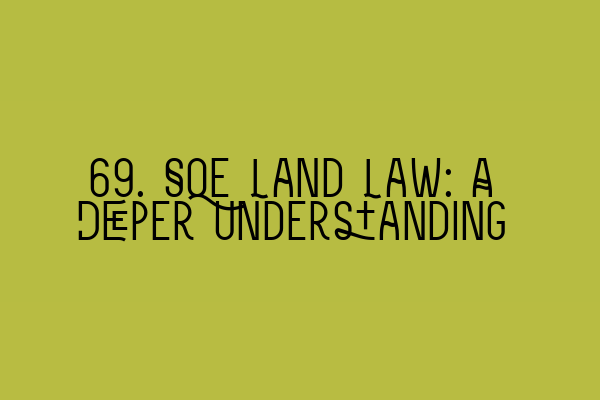SQE Land Law: A Deeper Understanding
Welcome to SQE Property Law & Land Law, a leading solicitor firm specializing in property law and land law. In this blog post, we will delve into the intricacies of SQE Land Law, providing you with a deeper understanding of this important subject matter. Whether you are a student preparing for the SQE exams or a legal professional looking to expand your knowledge, this comprehensive guide will be a valuable resource.
The Basics of SQE Land Law
Before we delve further, let’s start with the basics of SQE Land Law. SQE stands for Solicitors Qualifying Examination, which is the new assessment framework set by the Solicitors Regulation Authority (SRA) for individuals seeking admission as solicitors in England and Wales. The SQE consists of two stages, with Land Law falling under SQE 2.
Land Law is a fundamental area of law that deals with the various legal aspects of land ownership, use, and transfer. It encompasses a wide range of topics, including property rights, leases, mortgages, easements, and more. Understanding Land Law is crucial for solicitors as it forms the basis for many real estate and property transactions.
Key Concepts in SQE Land Law
Now, let’s explore some of the key concepts you need to be familiar with in SQE Land Law:
- Property Ownership: Understanding the different types of property ownership, such as freehold and leasehold, is essential. You need to know the rights and responsibilities associated with each type of ownership.
- Equitable Interests: Equitable interests refer to the rights and interests that a person may have in a property, even if they are not the legal owner. This concept is crucial when dealing with trusts and co-ownership.
- Leases and Tenancies: Leases and tenancies are legal agreements that grant someone the right to occupy or use a property for a specified period. Understanding the rights and obligations of landlords and tenants is vital in Land Law.
- Mortgages: Mortgages are a common way for individuals to finance the purchase of property. You need to have a solid understanding of how mortgages work and the legal consequences of defaulting on mortgage payments.
- Easements and Covenants: Easements are rights that a person has over another person’s land, such as a right of way. Covenants, on the other hand, are agreements that impose certain obligations or restrictions on the use of land.
Preparing for SQE Land Law
To succeed in SQE Land Law, preparation is key. Here are some tips to help you effectively prepare for this subject:
- Review the SRA Syllabus: Familiarize yourself with the SRA syllabus for Land Law, which outlines the specific topics and areas you need to study.
- Take Practice Exams: Practice exams are an excellent way to assess your knowledge and identify areas that require further study. Check out our SQE 1 Practice Exam Questions for additional practice resources.
- Enroll in Preparation Courses: Consider enrolling in SQE 1 Preparation Courses and SQE 2 Preparation Courses to gain a comprehensive understanding of Land Law and other relevant subjects.
- Stay Updated: Keep abreast of any updates or changes in Land Law. Follow professional legal publications and attend seminars or webinars to stay informed.
Conclusion
SQE Land Law is a critical subject that forms an essential part of the Solicitors Qualifying Examination (SQE). Understanding the key concepts and principles in Land Law is crucial for aspiring solicitors and legal professionals. By delving deeper into this subject matter and utilizing the right study resources, you can effectively prepare for the SQE exams and enhance your legal expertise.
For more information on SQE 1 and SQE 2 exam dates, please visit our article on SRA SQE Exam Dates.
We hope you found this blog post insightful. If you have any further questions or require legal assistance, please don’t hesitate to contact us. Our team of expert solicitors is here to help.
